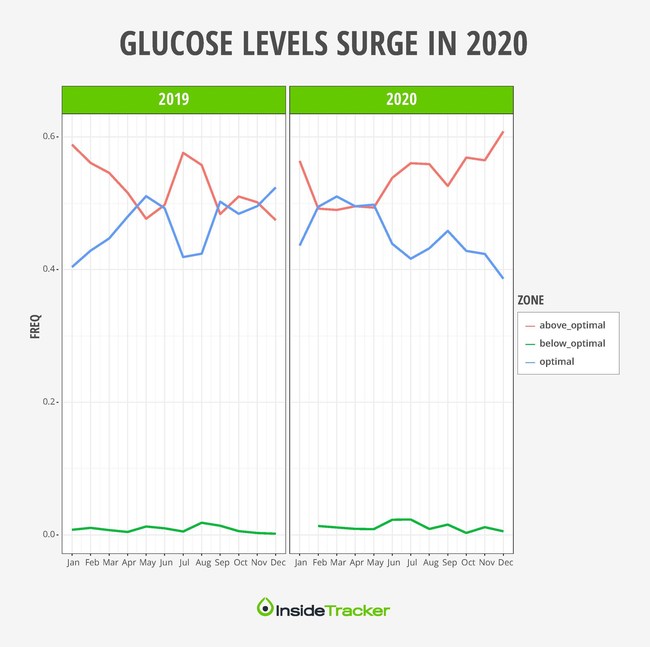CAMBRIDGE, Mass., March 17, 2021 /PRNewswire/ — We all know that 2020 looked quite different on the outside, but how did it look on the inside? InsideTracker, the leading ultra-personalized performance system, looked at pre- and post-lockdown blood biomarker data among thousands of users to provide an objective measure of the stress and lifestyle impacts of the past year.

InsideTracker’s user base is heavily weighted towards high performers who strive for optimal physical and cognitive health, such as elite strength and endurance athletes and other health-conscious people. Yet, even among a highly motivated sample group, 2020 left a mark.
The Word of the Year: Cortisol: Cortisol is the classic stress hormone that impacts immunity, metabolism, sleep, inflammation and performance. In the sample group, levels were significantly higher in 2020 (13.39 ug/dL) when compared to 2019 (12.88 ug/dL) and the percentage of subjects with optimal cortisol levels went down from 76 percent to 72 percent. Notably, in the last three months of the year alone, the percentage of users with optimal cortisol level dropped from 77 percent to 69 percent, year over year.
Several lifestyle changes can help reduce cortisol, including yoga, meditation, supplementation with adaptogens (specifically ashwagandha), and 7-9 hours of sleep every night. When cortisol levels trend above optimal, bodies respond by tapping into stored glucose in muscles and releasing it into the bloodstream. To combat this cycle of stress-induced blood sugar rises, turn to nutrient-dense snacks like whole-grain and sprouted breads, nuts, and berries.
Glucose: Not as Sweet as it Sounds: Over the years, the number of InsideTracker users with optimal and above optimal glucose has been quite steady, despite InsideTracker having aggressively optimized thresholds for glucose. However, in 2020, there was a shift towards the majority of users having above optimal glucose levels.
The most popular recommendations for lowering glucose are increasing dietary fiber (specifically through whole grains, oats and cruciferous vegetables), consistent physical activity (specifically adding high-intensity interval workouts 2-3 times a week), and getting 7-9 hours of quality sleep. The most common cause of increased glucose is diet, but high stress levels can also play a role, so lockdown created the perfect storm of both. To keep blood sugars stable, take a 10-20 minute walk after a meal, which will reduce the spike in glucose after eating, and add a nice break into your day.
LDL on the Rise: Average LDL (“bad cholesterol”) levels increased from 109.43 mg/dL in 2019 to 113.26 mg/dL in 2020, and the proportion of users with optimal levels went from an already-low 32 percent to 28 percent. Research shows that oxidized LDL (a dangerous form of LDL that causes plaque buildup in the arteries) is the real danger.
Through data collected since its founding in 2009, InsideTracker has identified the best foods for decreasing LDL and avoiding LDL oxidation. These include oatmeal, pistachio nuts, almonds, pinto and navy beans, the fermented foods kimchi and kefir and antioxidant-rich foods like goji and acai berries and black or green tea. Incorporating even a few of these foods into your diet will likely improve LDL levels and the type of LDL in your bloodstream.
Vitamin D: Message Received: Vitamin D levels increased from 38.15 ng/mL in 2019 to 40.05 ng/mL in 2020, with the percentage of users with optimal levels increasing by two percent. This is in line with the coverage that vitamin D received during the pandemic, as vitamin D is known to improve the function of immune cells, specifically those that fight infection.
To increase vitamin D, aim for 15-20 minutes of sunshine daily or 2000-5000 IU of vitamin D supplement to help optimize and maintain healthy levels. Also, look for “pasture-raised” on the label when purchasing eggs and meats. Fatty fish like sockeye salmon and mackerel are also packed with vitamin D.
Creatine kinase: A Bright Spot?: Creatine kinase (CK) is an indicator of muscle injury and increases with strenuous exercise. In athletic people, it can be an indicator of overtraining or insufficient recovery. CK levels decreased from 146.9 U/L to 135.6 U/L from 2019 to 2020, which moved four percent more InsideTracker users into the optimal zone. With races and competitions canceled in 2020, athletes likely eased up on their training leading to the decrease. In fact, there is speculation about whether the “forced recovery” of 2020 will lead to more record-breaking efforts from elite athletes on the world stage in 2021.
Taking 500mg of curcumin (the main compound in turmeric) has been shown to reduce elevated CK levels. We recommend making sure your supplement includes piperine (black pepper) which helps protect the curcumin from digestive enzymes and can increase its absorption by 2000 percent.
“InsideTracker users are among the most motivated, knowledgeable group you will find,” Dr. Gil Bander, co-founder and chief science officer, InsideTracker, said. “Yet, even among this high-performing group, which was armed with an easy-to-follow and science-backed action plan for optimizing their health, we found the impact of 2020 resounding across the board.”
About InsideTracker
InsideTracker is the leading ultra-personalized performance system that analyzes data from your blood, DNA, lifestyle, and fitness tracker to help you optimize your body and reach your health and wellness goals. InsideTracker’s patented algorithm and expert system transforms the body’s biomarker data into knowledge, insights, and customized action plans of science-backed nutrition, fitness, and lifestyle recommendations. Founded in 2009 by leading scientists in aging, genetics, and biometric data from MIT, Tufts, and Harvard, InsideTracker’s mission is to improve the healthspan of people everywhere so they can enjoy longer, healthier lives.
Follow InsideTracker on Instagram, Twitter and Facebook.
Media Contact:
Heather Hawkins
OutsidePR
(415) 598-8662
305368@email4pr.com
SOURCE InsideTracker

